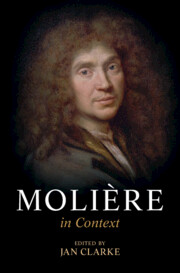Book contents
- Molière in Context
- Molière in Context
- Copyright page
- Dedication
- Contents
- Figures
- Charts and Tables
- Contributors
- Acknowledgements
- Translations
- Abbreviations
- Biographical Preface
- Part I Socio-Political Context
- Chapter 1 A Bourgeois at Court
- Chapter 2 The Religious Climate
- Chapter 3 Medicine
- Chapter 4 Family Law
- Chapter 5 Women
- Chapter 6 Gender, Masculinity and Cross-Dressing
- Part II Intellectual and Artistic Context
- Part III Theatrical Context (Paris)
- Part IV Theatrical Context (Court)
- Part V Reception and Dissemination
- Part VI Afterlives
- Further Reading
- Index
Chapter 5 - Women
from Part I - Socio-Political Context
Published online by Cambridge University Press: 10 November 2022
- Molière in Context
- Molière in Context
- Copyright page
- Dedication
- Contents
- Figures
- Charts and Tables
- Contributors
- Acknowledgements
- Translations
- Abbreviations
- Biographical Preface
- Part I Socio-Political Context
- Chapter 1 A Bourgeois at Court
- Chapter 2 The Religious Climate
- Chapter 3 Medicine
- Chapter 4 Family Law
- Chapter 5 Women
- Chapter 6 Gender, Masculinity and Cross-Dressing
- Part II Intellectual and Artistic Context
- Part III Theatrical Context (Paris)
- Part IV Theatrical Context (Court)
- Part V Reception and Dissemination
- Part VI Afterlives
- Further Reading
- Index
Summary
Questions to do with women can seem to have little significance in Molière’s theatre. However, some emerge from the array of apparently interchangeable female characters, just as some plays treat topics concerning women that were then being discussed amongst the educated members of polite society. Thus, as regards education, L’École des femmes speaks out against the limited and restrictive teaching of the time – especially in convent schools. Equally, some of the plays point up the anxiety of some young women who believed they were regarded as the prey in a hunt, together with the demeaning process by which many were married off, while others posit the possibility of pleasurable and companionable marriage. The plays also treat the position of independent women, either the apparently self-supporting female characters of La Critique de l’École des femmes, or widows like Célimène in Le Misanthrope. Molière’s works make use of a narrow range of women and are in no sense radical as far as they are concerned. But they mock and deflate male attempts to shape women’s lives or to control their identity, and might be said to demand freedom and self-determination for them.
- Type
- Chapter
- Information
- Molière in Context , pp. 52 - 59Publisher: Cambridge University PressPrint publication year: 2022

